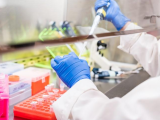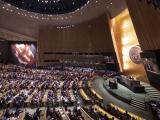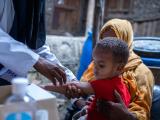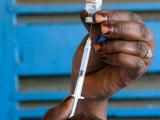Aug 26, 2002 (CIDRAP News) Health and Human Services (HHS) Secretary Tommy G. Thompson has named the 21 members of his Council on Public Health Preparedness, which will advise HHS on dealing with public health emergencies, including bioterrorism.
The council is chaired by Donald A. Henderson, MD, MPH, Thompson's principal science advisor on public health preparedness. The group is holding its first meeting today and tomorrow in Washington, DC, according to an HHS news release.
"This diverse group of very experienced professionals will be an invaluable resource in the ongoing effort to strengthen our nation's bioterrorism preparedness and response," Thompson stated.
Eleven of the council members are university professors or administrators; the rest come from settings such as state health departments, medical insurance companies, medical professional societies, hospital associations, a security foundation, and a drug company.
Henderson is a founding co-director of the Center for Civilian Biodefense Strategies at the Johns Hopkins University Bloomberg School of Public Health in Baltimore.
The council includes Michael T. Osterholm, MD, MPH, director of the University of Minnesota's Center for Infectious Disease Research and Policy, operator of this Web site.
Other members of the council follow:
- Georges C. Benjamin, MD, secretary of the Maryland Department of Health and Mental Hygiene
- Gail H. Cassell, PhD, vice president for scientific affairs and Distinguished Lilly Research Scholar for Infectious Diseases at Eli Lilly and Co. in Indianapolis
- James Chin, MD, clinical professor of epidemiology at the University of California, Berkeley, School of Public Health in Stockton, Calif.
- Francis Cigarroa, MD, president of the University of Texas Health Sciences Center in San Antonio
- Colleen Conway-Welch, PhD, MSN, professor and dean of the Vanderbilt University School of Nursing in Nashville
- Donald Fisher, PhD, president and chief executive officer of the American Medical Group Association in Alexandria, Va.
- Timothy T. Flaherty, MD, Neenah, Wis., member of the American Medical Association board of trustees
- Kathleen F. Gensheimer, MD, MPH, state epidemiologist for the Maine Department of Human Services in Augusta
- Mary Gilchrist, PhD, director of the University of Iowa Hygienic Laboratory in Iowa City
- Margaret Hamburg, MD, vice president for biological programs at the Nuclear Threat Initiative in Washington, DC
- Dennis G. Maki, MD, professor of medicine and head of infectious diseases in the Department of Medicine at the University of Wisconsin Medical School in Madison
- Robert A. Malson, JD, president of the District of Columbia Hospital Association in Washington
- Thomas L. Milne, executive director of the National Association of County and City Health Officials in Washington, DC
- Frederick A. Murphy, DVM, PhD, professor at the University of California, Davis, School of Veterinary Medicine
- William L. Roper, MD, MPH, dean of the School of Public Health at the University of North Carolina in Chapel Hill
- Paul B. Roth, MD, dean of the School of Medicine and associate vice president for clinical affairs for the Health Science Center at the University of New Mexico in Albuquerque
- Andrew A. Sorensen, PhD, president of the University of South Carolina in Columbia
- Michael Stocker, MD, MPH, chief executive officer of Empire Blue Cross and Blue Shield in New York City
- Ed Thompson, MD, MPH, state health officer for the Mississippi Department of Health in Jackson
HHS said the agenda for the council's first meeting includes bioterrorism preparedness and response programs, lessons learned from last fall's anthrax attacks, research and development efforts, and public health emergency response planning.
See also:
HHS news release
http://archive.hhs.gov/news/press/2002pres/20020823.html




















